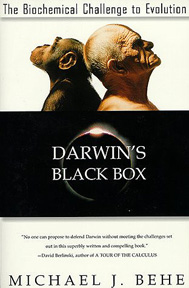Multimedia • Reference • Religion • Travel |
 Darwin's Black Box: The Biochemical Challenge to Evolution Michael J. Behe
Description From The Publisher: Virtually all serious scientists accept the truth of Darwin's theory of evolution. While the fight for its acceptance has been a long and difficult one, after a century of struggle among the cognoscenti the battle is over. Biologists are now confident that their remaining questions, such as how life on Earth began, or how the Cambrian explosion could have produced so many new species in such a short time, will be found to have Darwinian answers. They, like most of the rest of us, accept Darwin's theory to be true. But should we? What would happen if we found something that radically challenged the now-accepted wisdom? In Darwin's Black Box, Michael Behe argues that evidence of evolution's limits has been right under our noses -- but it is so small that we have only recently been able to see it. The field of biochemistry, begun when Watson and Crick discovered the double-helical shape of DNA, has unlocked the secrets of the cell. There, biochemists have unexpectedly discovered a world of Lilliputian complexity. As Behe engagingly demonstrates, using the examples of vision, bloodclotting, cellular transport, and more, the biochemical world comprises an arsenal of chemical machines, made up of finely calibrated, interdependent parts. For Darwinian evolution to be true, there must have been a series of mutations, each of which produced its own working machine, that led to the complexity we can now see. The more complex and interdependent each machine's parts are shown to be, the harder it is to envision Darwin's gradualistic paths, Behe surveys the professional science literature and shows that it is completely silent on the subject, stymied by the elegance of the foundation of life. Could it be that there is some greater force at work? Michael Behe is not a creationist. He believes in the scientific method, and he does not look to religious dogma for answers to these questions. But he argues persuasively that biochemical machines must have been designed -- either by God, or by some other higher intelligence. For decades science has been frustrated, trying to reconcile the astonishing discoveries of modern biochemistry to a nineteenth-century theory that cannot accommodate them. With the publication of Darwin's Black Box, it is time for scientists to allow themselves to consider exciting new possibilities, and for the rest of us to watch closely. Reviews "Mike Behe. . . makes an overwhelming case against Darwin on the biochemical level. No one has done this before. It is an argument of great originality, elegance and intellectual power. For readers who have been persuaded that biologists have long since demonstrated the validity of Darwinian theory, [Behe's] observations are apt to be a source of astonishment." —David Berlinski, author of A Tour of the Calculus "[Behe's] talent for lively exposition . . . charming convey[s] a sense of biochemistry's hidden beauty." —James Shreeve, New York Times Book Review "Michael Behe has done a top-notch job of explaining and illuminationg one of the most vexing problems in biology: The origin of the complexity that permeates all of life on this planet. . . . This book should be on the essential reading list of all those who are interested in the question of where we came from, as it presents the most thorough and clever presentation of the design argument that I have seen." —Robert Shapiro, author of Origins: A Skeptic's guide to the Creation of Life on Earth "A well-written and thoughtful statement of the biochemical challenge." —Will St. John, Detroit Free Press "[A] valuable crititque of an all-too-often unchallenged orthodoxy." —James A. Shapiro, National Review
Reader's Index Send us your favorite quotes or passages from this book. About the Author Michael J. Behe is Professor of Biochemistry at Lehigh University. He lives in Bethlehem, Pennsylvania. Table of Contents
Customer Reviews Write your own online review. Look for Similar Books by Subject | ||||||||||||||||||||||||||||||||||||||||||||||||||||||||||||||||
Copyright ©1996-2010 CenturyOne Bookstore. All Rights Reserved. All prices subject to change and given in U.S. dollars. Your purchase from CenturyOne.com will assist the CenturyOne Foundation in providing funding for various archaeological and research projects which seek to provide more information about the period of the First Century C.E., the origins of Christianity and the world of the Bible in general. All materials contained in http://www.centuryone.com are protected by copyright and trademark laws and may not be used for any purpose whatsoever other than private, non-commercial viewing purposes. Derivative works and other unauthorized copying or use of stills, video footage, text or graphics is expressly prohibited. |

